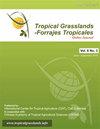台湾草的农艺特性[Cenchrus purpureus (Schumach.)]Morrone]和评估其在墨西哥温暖的半湿润气候中生产生物乙醇的潜力
IF 0.7
4区 农林科学
Q3 AGRICULTURE, DAIRY & ANIMAL SCIENCE
引用次数: 1
摘要
摘要本研究旨在探讨台湾草在6种刈割频率下的生物量、化学成分、近似分析、热值及生物乙醇理论产率。当刈割频率为180 d时,生物量最高(33 t DM/ha),纤维素含量最高(41.3%),热值最高(17.5 MJ/kg DM),潜在生物乙醇产量最高(7,936 L/ha)。脱水样品的水分含量、灰分和粗蛋白质浓度在收获频率为30 d时最高,分别为9.2、12.1和10.5%。提取液浓度在60和120 d时最高(分别为13.9%和13.7%),木质素浓度在150和180 d时最高(分别为21.1%和20.9%)。固定碳浓度在收获频率为90 d时最高(18.5%),而挥发物浓度在收获频率为30 d时最低。本研究结果显示,台湾草具有生产生物乙醇的潜力,但需要评估整个生产过程的碳足迹、生命周期分析、能量产出(产生的能量:消耗的能量),以确保在采用该工艺之前对气候变化和温室气体排放有积极的影响。本文章由计算机程序翻译,如有差异,请以英文原文为准。
Agronomic characterization of Taiwan grass [Cenchrus purpureus (Schumach.) Morrone] and evaluation of its potential to produce bioethanol in the warm sub-humid climate of Mexico
The objective of this study was to evaluate the biomass production, chemical composition, proximate analysis, calorific value and theoretical yield of bioethanol of Taiwan grass under 6 cutting frequencies. The highest production of biomass (33 t DM/ha), cellulose content (41.3%), calorific value (17.5 MJ/kg DM) and potential bioethanol yield (7,936 L/ha) were recorded at a cutting frequency of 180 days. The highest moisture content of the dehydrated samples and ash and crude protein concentrations were observed at a harvest frequency of 30 days with 9.2, 12.1 and 10.5%, respectively. The highest concentrations of extractives were obtained at harvest frequencies of 60 and 120 days (13.9 and 13.7%, respectively), while lignin concentrations were greatest at harvest frequencies of 150 and 180 days (21.1 and 20.9%, respectively). The highest concentration of fixed carbon was observed at a harvest frequency of 90 days (18.5%), while the lowest concentration of volatile matter occurred at a harvest frequency of 30 days. The data indicate that Taiwan grass has significant potential for use to produce bioethanol but assessment of the carbon footprint, life cycle analysis, energy yield (energy produced:energy consumed) of the entire production process is needed to ensure there are positive effects on climate change and greenhouse gas emissions before this process is adopted.
求助全文
通过发布文献求助,成功后即可免费获取论文全文。
去求助
来源期刊

Tropical Grasslands-Forrajes Tropicales
Agricultural and Biological Sciences-Agronomy and Crop Science
CiteScore
1.60
自引率
0.00%
发文量
36
审稿时长
16 weeks
期刊介绍:
The Journal publishes, in English or Spanish, Research Papers and Short Communications on research and development, as well as contributions from practitioners (Farmer Contributions) and Review Articles, related to pastures and forages in the tropics and subtropics. There is no regional focus; the information published should be of interest to a wide readership, encomprising researchers, academics, students, technicians, development workers and farmers.
In general, the focus of the Journal is more on sown (''improved'') pastures and forages than on rangeland-specific aspects of natural grasslands, but exceptions are possible (e.g. when a submission is relevant for a particularly broad readership in the pasture and forage science community).
The Journal will also consider the occasional publication of associated, but closely related, research in the form of an additional scientific communication platform [e.g. a re-make of the former Genetic Resources Communication series of the former Division of Tropical Crops and Pastures of the Commonwealth Scientific and Industrial Research Organisation (CSIRO), Australia].
Areas of particular interest to the Journal are:
Forage Genetic Resources and Livestock Production[...]
Environmental Functions of Forages[...]
Socio-economic Aspects[...]
Topics within the aforementioned areas may include: Diversity evaluation; Agronomy; Establishment (including fertilization); Management and utilization; Animal production; Nutritive value; Biotic stresses (pests and diseases, weeds); Abiotic stresses (soil fertility, water, temperature); Genetics and breeding; Biogeography and germplasm collections; Seed production; Ecology; Physiology; Rhizobiology (including BNF, BNI, mycorrhizae); Forage conservation; Economics; Multilocational experimentation; Modelling.
 求助内容:
求助内容: 应助结果提醒方式:
应助结果提醒方式:


